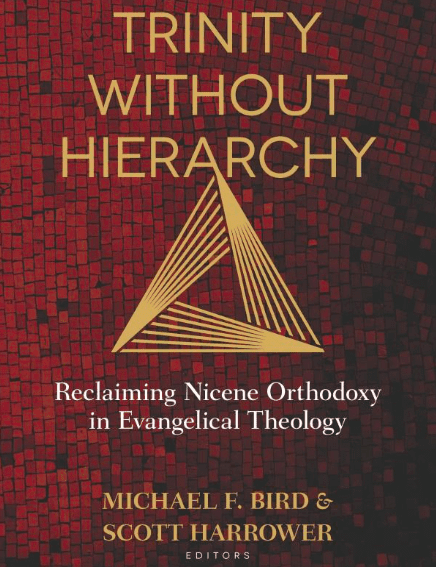 When the Book of Hebrews calls someone “God” to whom is the author referring? Is “God” always the “Father” so that one can equate God with Father in Hebrews? Or, do we need to query the text and its context to know Who is Who and to Whom the author is referring? (Yes.)
When the Book of Hebrews calls someone “God” to whom is the author referring? Is “God” always the “Father” so that one can equate God with Father in Hebrews? Or, do we need to query the text and its context to know Who is Who and to Whom the author is referring? (Yes.)
In her sparkling essay, Amy Peeler (“What does ‘Father’ Mean? Trinity without Tiers in the Epistle to the Hebrews”) explains Hebrews’ theo-logy and contends the positions of Bruce Ware, Wayne Grudem and Owen Strachan are lacking. There is clearly some shifting and some side-stepping and some back-tracking and some re-expressing going on this circle of former eternal subordinationists, but their changes are not as clear as they ought to be — nor do their audiences realize just how far off at times they got. The issue often has been their lack of attention to inseparable operations.
In their new book, Michael Bird and Scott Harrower (Trinity without Hierarchy: Reclaiming Nicene Orthodoxy in Evangelical Theology) collect essays, one of which is by Peeler. Here are some highlights:
Father and Son are each Theos (4:14; 1:8, 9). [She does not discuss Spirit in this essay since space prohibits.]
Hence, when one is analyzing Hebrews and comes to the term theos or kyrios, it is exegetically responsible, even necessary, to inquire which referent—God the Father, God the Son, or the triune God—the author might be invoking.
A solid section follows that has this conclusion: The Father and the Son share (or have) the same glory, power, and will in Hebrews.
The shared power and glory between the Father and the Son in the opening sentences also point toward the will they both share. Participation of both the Father and the Son in the actions described above suggest that they both willed to create, to sustain the creation, to cleanse sin, and to reign over all things. There is one will of God which both Father and Son enact, although they enact this one will in different ways.
Thus far, in an attempt to read Hebrews faithfully, I believe I have articulated theological positions with which few would disagree. God the Father and God the Son share glory and power and will because both are God, yet the author also can describe them as distinct persons who perform distinct actions in the economy of salvation.
Her large claim then is that the Father’s initiation and the Son’s obedience do not indicate tiers or the dynamic of authority and submission.
Hebrews discloses that God the Father and God the Son, distinct persons, are both gloriously sovereign and in their sovereignty have acted out their one will to redeem humanity. The author uses pater/huios language to convey the uniquely intimate relation between distinct persons of God.
The word “Father” as father as well as some interpretations lead some to think the Father has an eternal authority and the Son an eternal subordination. Peeler disagrees:
ERAS supporters [Ware, Grudem, Strachan] seem to equate the Father’s initiation with the Father’s authority. I have endeavored to show that there was never a time when the Father’s authority was distinct from and supreme to the Son’s since Father and Son are mutually dependent upon the other, and upon the Spirit, for the distinction of relationship. In addition, since the Son as God was appointed heir of all things before creation and remains sovereign at God’s right hand forever, they share in equal authority. One must also assume that sending and being sent imply the distinction of authority and submission but the Father sending the Son indicates not submission to the will of the Father, but enactment of the will of God. There was and is authority but no submission, for the authority was given by the Father to the Incarnate Son as a reiteration of the equal glory, will, and power of the eternal Son.
In close, why does it matter to assert equal authority but no eternal submission? Eternal submission is to misunderstand the Son, and therefore diminish his glory, power, and will. I see no way that a decrease of the divinity of the Son can be avoided when he is portrayed as not just eternally responsive, but eternally submissive. Eternal submission of the Son also misapprehends the Father as a God who retains power rather than shares it, and if there were ever a day when the evangelical church needed a correction on its understanding of power, that day is now. [my italics in this paragraph]
[She has a summary of conclusions in footnote 5: “In my own analysis, I see likely reference to God the Father in 1:1; 2:4*, 9*, 13*, 17; 4:14; 5:4,10; 6:6; 7:3, 25*; 9:14, 24; 10:29; 12:2; 13:15,* 20* (the asterisk indicates passages that might be God as triune). I see 10:7,12,21, 31; 11:4, 5, 6,10,16,19, 25,40; 12:7, 22, 23, 28, 29; 13:4, 7,16.]











